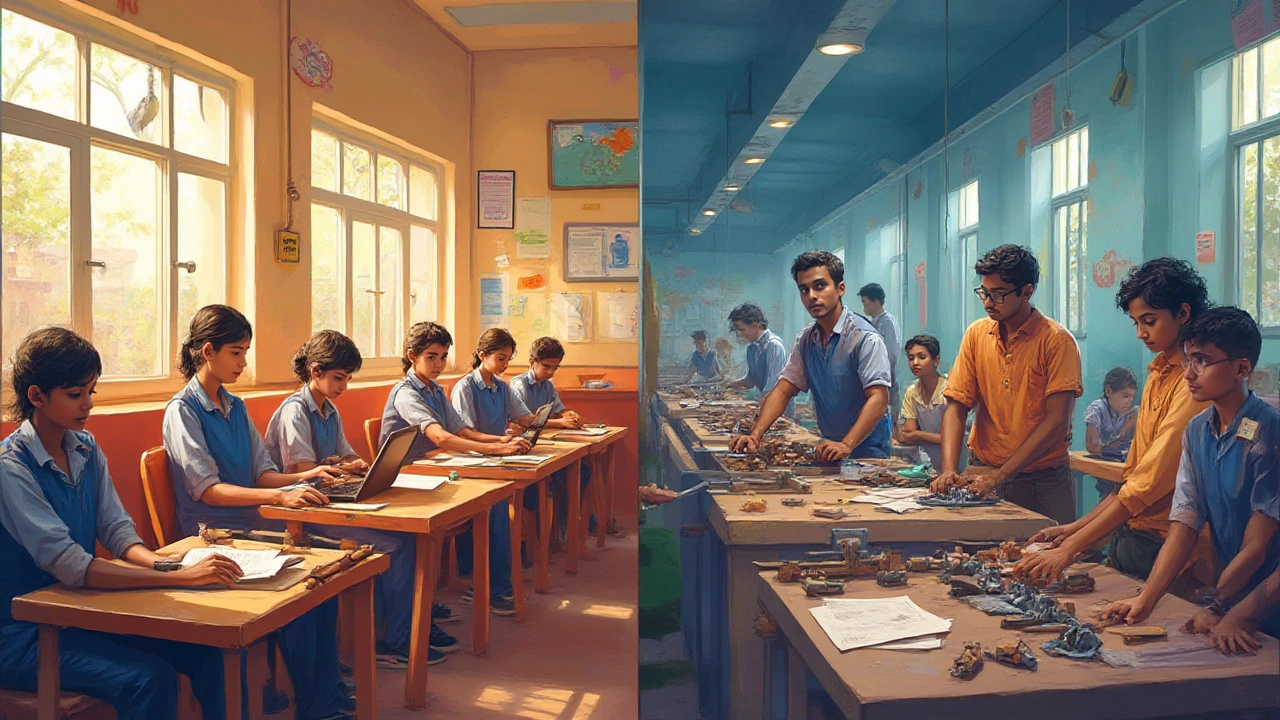You ever notice how a fresh coat of paint and a new sofa can make a house feel totally different? That’s exactly what separates vocational and educational tracks—they look like they're serving the same purpose at first, but once you step inside, the vibe changes completely. People toss these words around all the time, but when it comes to choosing your own path, you really don't want to mix them up. Sounds dramatic, but we’re talking about your style of learning, your career goals, even your lifestyle down the road. Think in terms of hand tools versus textbooks: both have value, but only one’s gonna help you fix a leaky tap tonight.
The Heart of the Matter: What Is Vocational? What Is Educational?
The word 'vocational' gets tossed about in career fairs and job adverts, but what does it really mean? If we drill down, vocational learning is all about the job itself. It’s training that gears you up for a particular trade or position, like becoming an electrician, a hairdresser, or a plumber. This kind of learning skips a lot of the broad theory and dives straight into what you need when you're on the job. If you thrive using your hands, want to get into work fast, and love practical problem-solving, vocational training has your name all over it. Here in England, stats from 2024 show more than 27% of job vacancies in technical fields were filled by candidates with vocational backgrounds, not traditional degrees.
Educational, by contrast, is the classic route most people imagine: it’s focused on theory, knowledge, and foundational skills you can apply to lots of different settings. University degrees, A-levels, GCSEs—all these fall under the educational umbrella. They’re broad, crossing over many subjects like history, science, or maths, and often ask you to think about 'big picture' issues. The idea is to prepare you for long-term growth, sometimes at the expense of quick job-readiness. A 2023 survey by the UK Department for Education found that about 56% of parents still favoured traditional academic routes for broad career possibilities, even as the economy shifts to value practical skills more.
Let’s put it simply: Vocational training is about learning how to do something specific—think using a welding torch or operating medical equipment. Educational learning is about understanding ideas—like algebraic equations, the French Revolution, or why bacteria multiply. Generally, vocational paths take less time (months, not years), and put you straight into work, while educational routes are longer, often leading to university or advanced research. But there’s a flip side: educational paths can give you more flexibility if you change your mind later. If you want an example, look no further than T Level courses, launched in England in 2020—these two-year programmes bridge the gap, offering vocational learning blended with classroom study, and they now enroll over 21,000 students nationwide.
You’ll notice this difference in daily life, too. Walk into a hair academy and you’ll see practice heads, scissors in hand, students working on their craft from day one. At university, first-year classrooms are packed with lectures and discussion, not hands-on work. That’s by design—because vocational settings know employers care about what you can do, not just what you know. And here’s something most people don’t talk about: employers in 2025 are actively searching for candidates with real-world, job-specific training, especially in industries short on staff.

How Each Path Shapes Your Career and Lifestyle
Your choice of vocational or educational training won’t just change what you’re taught; it can shape your whole career outlook—and maybe even your lifestyle. Let’s start with money, because that’s never out of style. According to the UK Office for National Statistics, people with an engineering apprenticeship—one of the top vocational tracks—now earn more, on average, in their first five years than new university graduates in arts or social sciences. Surprised? That’s the power of job-specific skills.
But money isn’t the only thing in play. If you crave freedom and hate the thought of sitting through three-hour seminars, vocational tracks could get you earning quickly. Many vocational courses also offer 'earn while you learn' options through apprenticeships, so you can bank some wages as you train. And, because vocational courses often respond fast to market needs, you’re much less likely to see your skills go out of date. Just check the local colleges around Birmingham—one recently rolled out a new course on renewable energy installation after the UK government announced the Green Homes Grant. Students signed up fast, knowing jobs would follow soon after.
Now, educational routes have their perks. Degrees are still the golden ticket in professions like law, medicine, or academia. There’s no quick workaround—medical school is long and brutal, but there’s a good reason: you need a deep, broad base of knowledge to treat patients or argue court cases. The flexibility is massive, too. An English literature degree doesn’t just prep you for teaching; you can slide into publishing, marketing, or even consultancy. It’s like buying a pair of boots that go with everything, while vocational routes give you specialised shoes for one purpose. In fact, a 2024 LinkedIn study showed that 34% of UK degree holders changed industries within their first ten years on the job. Movement like that is much harder for people trained for one very specific trade—unless they’re ready to retrain.
There’s more to think about. Social life, debt, and even stress look different depending on your choice. University culture has its late-night library sessions, societies, and wild Freshers’ Weeks. Vocational training is usually quicker and tighter-knit—smaller groups, less stress about exams, but also less of the 'student life' experience that gets romantically spun in the movies. Oh, and then there’s student debt: here in England, the average vocational learner walks away after two years with less than a third the debt of their uni-bound peers (according to Student Finance England’s 2025 report). That matters when you’re eyeing your first flat or saving for a car.
Got family pressure to think about? You’re not alone. Plenty of students feel nudged toward traditional education because their parents see it as 'safe.' But employers in construction, health, engineering, and IT are putting in more job ads that specifically ask for candidates with hands-on vocational skills. Even top employers like Network Rail and Balfour Beatty have started recruiting straight from vocational colleges. So, if someone tells you vocational is second-best, point to the stats—and maybe ask them to compare paychecks.

Making a Choice: Questions and Tips for Picking Your Route
Standing at this crossroads, it’s tempting to listen to opinions from well-meaning teachers or family. But the only compass that matters is yours. Ask yourself: What kind of tasks fire you up? Do you want to get working right away, or would you rather dive deep into a subject, then decide on a career later? Are you someone who learns by doing, or do you actually enjoy theory and exams?
Let’s get concrete with a quick tip-list to help with decision-making:
- List your interests and strengths. Are you practical, or more analytical? Talk to people in different careers to get a honest view.
- Visit open days—both at local colleges and universities—and ask questions about daily life, not just job outcomes.
- Check local labour stats (like the ones from West Midlands Combined Authority) for which jobs are hiring this year and what qualifications they actually ask for.
- Remember: it’s possible to switch! Many vocational qualifications give you credits that count toward a degree later.
- Watch for hybrid programmes, such as Higher National Diplomas (HNDs) or T Levels, which offer a blend of practical and academic learning.
Don’t forget about soft skills. Employers in 2025 are demanding more than just technical knowledge. Communication, teamwork, and critical thinking can bump up your CV, no matter which route you choose. Some vocational courses now include modules on business basics, digital skills, or customer service to help graduates stand out. Here's a useful way to compare outcomes:
| Path | Duration (Average) | Example Jobs | Average Starting Salary (UK, 2025) | Progression |
|---|---|---|---|---|
| Vocational | 1-2 years | Electrician, Dental Nurse, Plumber | £22,000-£28,000 | Can gain more qualifications, some apprenticeships reach degree level |
| Educational | 3-4 years | Teacher, Lawyer, Researcher | £24,000-£32,000 | Can continue with Masters or PhD, more career flexibility |
Choosing between vocational and educational routes is not about picking which is better—it’s about choosing which fits you best. The fastest way to end up stuck is to listen to the wrong voices. Dig into what fires you up, see where the local job market is headed, and choose the road that makes sense. And remember, whatever the route, employers care most that you can turn up, get stuck in, and do your job well. Whether that comes from learning in a workshop or a lecture hall, it’s still your future, your call. Don’t let anyone convince you otherwise.
